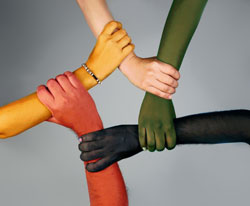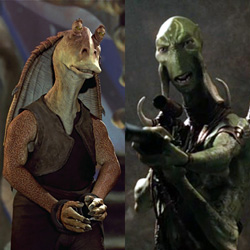
Race is a topic that pops up time and time again in A Princess of Mars, in subtle—and sometimes not-so-subtle—ways. (Well, not to mention sexism, a topic certainly worthy of its own post.)
This latest chapter, “With Dejah Thoris”, is perhaps another interesting look into the mind of our hero, John Carter, and subsequently the author, Edgar Rice Burroughs … if we use the topic of race as our lens.
It has already been established that there are at least two major sentient races on Barsoom: the “barbaric” green Tharks, and the “civilized” red Martians.
A podcast listener pointed out to me that, in chapter one, Carter could not distinguish the culture of the Tharkian horde from that of the Apache tribe that killed his friend, James K. Powell, and that had pursued Carter to the mouth of the cave. In so doing, Carter paints both groups as savage and violent, killing for pleasure, and having little regard for human life. He further describes the the Tharks as deadly scavengers that plunder what provisions they cannot otherwise manufacture themselves by attacking innocent civilians.
In contrast to this are the red-skinned race of human-like Martians. The princess Dejah Thoris explains to John Carter the scientific innovations that her race has made to allow life to survive on their dying planet. When her convoy was attacked by the Tharks, they were in the midst of conducting scientific test on atmospheric density. Later in chapter 11, she tells Carter that they have instruments that can observe in great detail any world they wish, because they are simply “hanging in the heavens in plain sight”.
But, according to Dejah Thoris, the red and green races haven’t always been the only ones populating Barsoom. In chapter 11, we are also introduced to three others, existing 100,000 years prior to the events in A Princess of Mars. One is a community of “fair-skinned” (presumably white) people, which Carter notes are very similar to himself in appearance, judging from the artwork he sees on the walls of his quarters. The second is a race of reddish-yellow Martians, which at this point are little-described. Third, and perhaps most notably, he mentions a people with black skin, counting them among the three great races of old.
These three distinct ethnic groups are forced to inter-marry as a means of survival due to the deteriorating conditions of their planet. After many millennia in interbreeding, the race of red Martians gradually forms: Dejah Thoris’ progenitors.
When this story was written, in 1912, race was very much (and still is) a contentious issue in America and elsewhere in the world. The concept of races intermarrying was completely unheard of. Only in 1967 did the Supreme Court of the United States decide that anti-miscegenation laws were unconstitutional. But the law of the land doesn’t necessarily change the minds of all its people. The children of interracial parents are bullied about their race by the people who fear the so-called “beige-ing of America”—a fear that a non-white majority will rise to power and marginalize what was once the former majority, until the white race disappears under the waves of a sea of interbreeding.
Was any of this playing in John Carter’s mind? Let’s take a moment to recall his origins. In the beginning of chapter one, he unapologetically introduces himself as a captain in the army of the Confederate States of America—a government which formed as a direct result of the election of a new, anti-slavery Republican party to office. When the southern slave states were defeated in the Civil War, John Carter curiously seems to accept the defeat in stride. He re-architects his life by moving out west with his buddy Powell (another Confederate soldier), in a search for gold to replace all their worthless Confederate dollars.
Due to his political and military affiliations, it’s probably a foregone conclusion that John Carter, a Virginian, was pro-slavery and therefore had a strong opinion about the equality of the races. Despite that (or because of it), he chronicles in his memoirs the topic of the “great races” of Mars in clear detail, rather than omitting it entirely. He states in very blunt terms that these races needed to align and combine for the survival of all involved, and makes no opinion on the matter one way or another.
But perhaps the most intriguing fact of all is that he—a Confederate officer of a pro-slavery nation—has no hesitations or moral issues about falling in love with someone who is the descendent of many races (including, interestingly, the black race of Barsoom). Rather, she is someone with whom he ascribes Earthly, womanly traits … traits that are achingly familiar to him.
If John Carter felt this way in the context of the story, I wonder what Edgar Rice Burroughs thought of the whole thing. In the recorded forward to this novel, I consciously omitted a line written by the fictional “Edgar Rice Burroughs”: “We all loved [Captain Carter], and our slaves fairly worshipped the ground he trod.” I omitted this line because I felt that it really had no place in the story, and I was uncomfortable reading it. Besides, chronologically, this fictional Burroughs’ life existed well before the actual life of the real author.
Was “Edgar Rice Burroughs” shocked by Captain Carter’s memoirs and admittances? Was the real Edgar Rice Burroughs poking at his own internal prejudices? Is his opinion even reflected in this story? It’s all very interesting to me.
 A few weeks after The Phantom Menace hit the screen, movie critics from across the country began to slam the film and George Lucas for perpetuating racial stereotypes. An article in
A few weeks after The Phantom Menace hit the screen, movie critics from across the country began to slam the film and George Lucas for perpetuating racial stereotypes. An article in